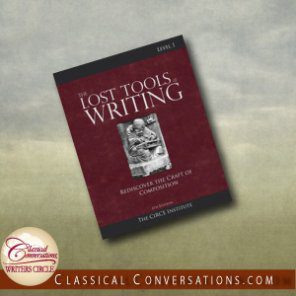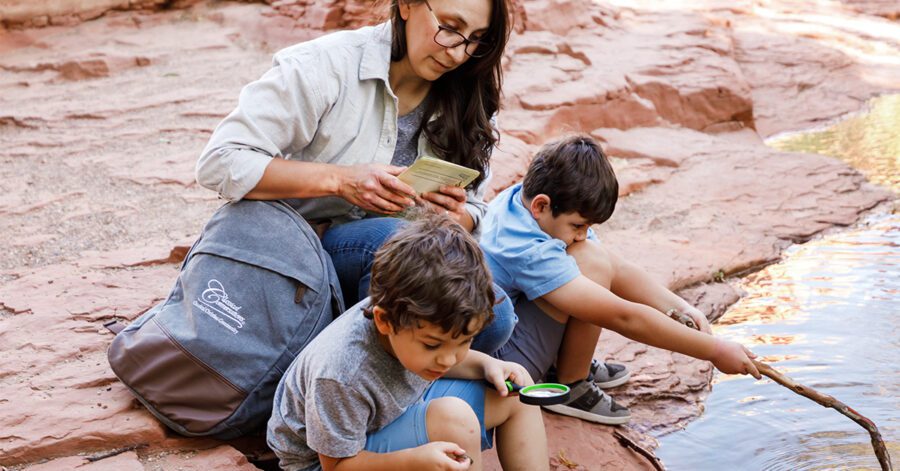Last year, our homeschool community, Classical Conversations, introduced the Lost Tools of Writing program as parts of the seventh and eighth grade curricula. This was a good, good thing. I am no expert in the Lost Tools curriculum or in the application of all it has to offer, but what I have seen has been fantastic. I offer you one thought in particular to express my excitement.
Classical Conversations students study grammar and composition through our Essentials program from approximately age nine through age twelve (plus or minus a few months). Here they learn how to recognize and use the parts of speech, how to classify a sentence from one of the 112 possible choices, how to make a key word outline, how to diagram a sentence, how to write an essay, how to write from a source, as well as from image prompts, how to present their essay in front of an audience, and so on. They also do much, much more than this, but being a dad, I am not in class with them every week, so my list is shorter than it could be.
I have watched my Essentials students, Calvin and Rose, progress in their knowledge and skills over the last year and a half. I am thrilled to think that they have another year and a half to go in this highly profitable program. I do not have a large enough vocabulary to adequately express my love of Essentials.
With the advent of the Lost Tools of Writing (LTW) into the junior high years, Classical Conversations has taken a huge leap forward in preparing our children for the classical arts of dialectic and rhetoric. The main benefit I am seeing right now is that the program could just as appropriately have been named “The Lost Tools of Thinking.”
“Thinking” is the missing link between learning your parts of speech and writing a good academic essay. The Lost Tools of Writing program fills that gap, incrementally and progressively, until students are thoroughly prepared to enter high school rhetoric.
Often tutors, parents, and students are struck with a sense of overwhelming disillusionment upon seeing the first few lessons of LTW. It seems silly to write such a “rudimentary” essay, but the rudiments are exactly what we need at this point. The students have learned the rudiments of English grammar and composition through the Essentials program, but now they (students, parents, and tutors) need to learn the rudiments of thinking, and LTW has the plan in place to do that very thing.
We are finite creatures. These bodies were conceived, born, and will one day wither and perish. One does not have to consider the human condition very long to recognize our physical limitations. We cannot fly. We cannot breathe water. We have to eat and drink or we will die. The list goes on forever. That is just how limited we are.
However, we are limited in more ways than just physically; we are limited mentally as well. We cannot think about everything all at once. No one is actually a “global thinker.” In order to overcome this limitation, we have to compartmentalize and categorize. We have to sift and sort reality into bite-size packets in order to allow our feeble little brains to “metabolize” it. We have to chew on thoughts for a while and as with our mouths, we can only fit so much into our minds at one time.
One of the beauties of LTW is that this inherent human limitation is recognized and a solution is offered. In fact, the entire curriculum is a solution to this limitation. The art of thinking is introduced in the very first lesson and this art is taught until the very end. This seems facile at first, especially after seeing fifth and sixth graders write such fantastic essays in Essentials, but fifth and sixth grade essays are only appropriate for fifth and sixth graders. They need to mature in their ability to think as the brain God gave them develops in its capacity to think.
The first lessons of LTW dispense with the complexities of eloquent writing in order to begin lessons in the “forms” of thought. This return to “square one” of the art of thinking is exactly where we all need to go. We need to be taught how to categorize the world around us in our minds, so that we overcome our inherent mental limitations. Once the students master the process of well-formed thinking, then they will return to the study of eloquence in order to present their thoughts beautifully in their writing.
In my years as a home school, high school tutor, I have seen many children who have acquired the basic abilities of composition through the Essentials program and are writing essays in ninth grade that most college professors would love to see come across their desks, but I have also watched these same students hit a brick wall when it comes to digging anywhere below the surface of most topics. This is where the Lost Tools of Writing comes in, for in between the rudiments of elementary grammar and the rudiments of high school rhetoric must come the rudiments of thinking well.
The prophet Zechariah exhorted Israel not to despise the day of small things (Zech. 4:10). Lesson 1 of Part 1 of the Lost Tools of Writing curriculum is a little, bitty baby step in the long, long journey toward beautiful thinking and writing. This “small thing” is not to be despised. The Lost Tools of Writing program is a tiny seed which, if nurtured, will grow into a mighty oak of analysis, imagination, and beautiful writing from our children and students.




